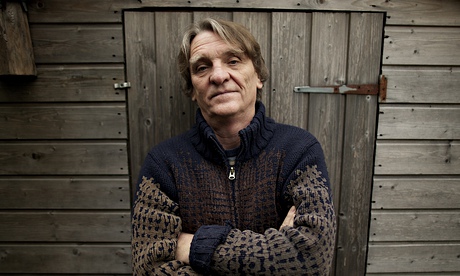
Melvin Burgess is chipper. Having just watched me interview YA author Matthew Quick, Burgess's stage-buddy at 2014 Edinburgh international books festival, the Carnegie-winning author of iconic YA books Junk and Doing It, launches straight into the books behind his own.
"There are a few actually," he says, about the book that inspired him to write. "It's interesting that Matthew came up with both Slaughterhouse Five and The Old Man and the Sea, which are two books that just blew me away when I was a teenager. Fantastic, wonderful books; both had this quality that I really admire in novels and that is its simplicity and truth."
"One of my great heroes was George Orwell who had this thing about writing politics and that has the potential to be a very boring subject. However, Orwell wrote about it so simply that you could understand it if you were 12 years old. He taught me the truth: there is no such thing as difficult ideas, there's only badly expressed ideas. And if you write it well and clearly and simply, it's understandable – and I truly believe that."
"The German writer, Brecht, did the same thing as Orwell in his poetry, which was to write really simple stuff in speech rhythms rather than poetic rhythms and it was very truthful. Not all of it but some of it."
"It was deceptively simple," Matthew Quick volunteers, who is sitting nearby, and Burgess agrees.
What would today's Burgess would tell his 10-year-old self? He immediately exclaims, "'Calm down! Don't worry so much, it's going to be alright!'"
"I didn't enjoy my teen years," he says. "I never met people who I really got on with until I had left school. It's not an uncommon experience. I did have friends because at school you needed friends to survive. You need to have colleagues; otherwise you are completely lost. So you do make friends but I now I have like-minded people around. So I would say: 'Hang on in there, school doesn't last forever.'"
Burgess's last book, The Hit, came out in early 2013. I ask about what he's working on.
"One of the things that I think is still a big taboo in YA stuff is politics, and there's a reason for that: politics is about taking sides," he says. "It can be about revealing things and telling the truth but, in the end, it's about taking sides; being partisan, in a way. And yet novels are good about being partisan because they ask questions rather than give answers. But it can be done: Orwell did it, people have written really good political novels – and we shy away from it."
"You know," he continues, taking a drink. "I can't think of the last really good political novel that I wrote and I would love to do it again. So that's what I'm working on: a contemporary political fantasy."
Who was his his childhood hero? Burgess smiles fondly. "When I was very young, I thought my dad was the best and he was great, my dad. He read to me, he looked after me and he had a great gift for language. He was Irish and he had a great turn of phrase."
What about writers? "There was an author when I was young called Gerald Durrell. Do y'know him?" Burgess says. I nod and Burgess smiles. "He also founded Jersey Zoo, which was the first conservation zoo so he was ahead of his time. He was a very big hero of mine."
"Another was a guy called Mervyn Peake. Do you know Gormenghast?" I say no. "Oh, you should read Gormenghast. I've been praising truthful, simple things and Gormenghast is a fantasy written in a very Gothic style, with these long, gorgeous sentences, which just land on a sixpence. It was a character-driven fantasy and there's just nothing like it."
I bring up Junk, arguably Burgess's most famous novel. Why does he think its legacy has lasted? "It has a historical position because it was a very early, proper YA book," he says. "When it came out it had a real significance. The teenage fiction genre at the time was really for younger kids and not for teenagers."
"When you write something and you're early on in the writing process, you make up your own rules, you set out the territory. It might be quite obvious territory but you're still setting it out. That's why Junk's legacy has survived because I didn't know the territory, I was inventing it. It really was an adventure for me."
"If you're lucky enough to come along at a time when there's a genre that's just developing, it does give you unparalleled opportunities, which aren't there later on. It was for that reason that I got to explore a territory which hadn't been explored before."

